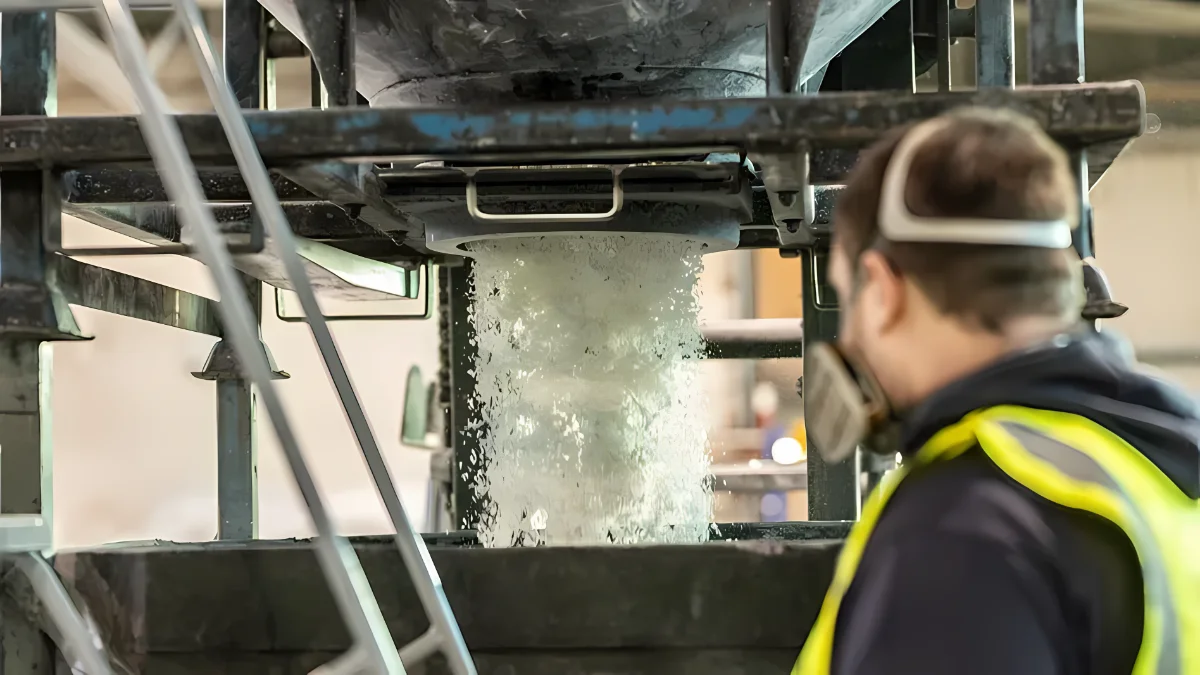Smile Plastics hat durch die Umwandlung von Kunststoffabfällen in wertvolle Baumaterialien tiefgreifende Auswirkungen auf die Recycling- und Designbranche. Durch die Expansion des Unternehmens wird nicht nur die Produktionskapazität verdreifacht, sondern es dient auch als Leuchtturm der Innovation bei der Verwendung recycelter Materialien. Smile Plastics verbraucht jährlich über 3.000 Tonnen gemischte Kunststoffabfälle und recycelt damit nicht nur; das Unternehmen definiert die Ästhetik und Funktionalität recycelter Produkte neu.
Die neue Anlage befindet sich in einer ehemaligen Schokoladenfabrik in der Nähe von Swansea und ermöglicht es dem Unternehmen, die Qualitätskontrollen zu verbessern und die Prozesseffizienz zu optimieren, wodurch schnellere Durchlaufzeiten für größere Bestellungen gewährleistet werden. Diese Erweiterung spiegelt Smile Plastics' Engagement für Nachhaltigkeit wider und zeigt, wie recycelte Materialien sowohl schön als auch funktional sein können.
Die firmeneigene Technologie haucht weggeworfenen Kunststoffen neues Leben ein und verwandelt sie in Platten mit einer Reihe von Mustern und Farben – von Natursteinimitationen bis hin zu kräftigen, farbenfrohen Designs. Diese Platten finden in verschiedenen Umgebungen Anwendung und demonstrieren die Vielseitigkeit und Attraktivität recycelter Materialien.
Darüber hinaus zeigt sich Smile Plastics Engagement für eine Kreislaufwirtschaft in seinem Cradle-to-Cradle-Produktionszyklus. Sein innovativer Ansatz stellt sicher, dass gebrauchte Platten und Produktionsabfälle vollständig recycelbar sind, was einen nachhaltigen Lebenszyklus seiner Produkte fördert. Dieses Engagement erstreckt sich auch auf einen Rückkaufservice, der das Recycling ausgedienter Platten fördert und das Nachhaltigkeitsethos des Unternehmens unterstützt.
Mit Blick auf die Zukunft plant Smile Plastics, sein erfolgreiches Modell global auszuweiten. Durch den Aufbau eines dezentralen Fabriknetzwerks möchte das Unternehmen die Nachfrage nach lokaler Fertigung erfüllen und gleichzeitig die Umweltbelastung minimieren. Diese Vision unterstreicht die Rolle von Smile Plastics als führendes Unternehmen im Bereich der nachhaltigen Fertigung und ebnet den Weg für eine Zukunft, in der recycelte Produkte nicht nur wegen ihrer Umweltvorteile, sondern auch wegen ihrer Schönheit und Zweckmäßigkeit geschätzt werden.
Der Weg von Smile Plastics von einem bescheidenen Unternehmen zu einem weltweit führenden Anbieter von recycelten Baumaterialien ist ein Beweis für die Kraft von Innovation und Nachhaltigkeit. Ihre Expansion stellt einen wichtigen Meilenstein im Kampf gegen Plastikmüll dar und beweist, dass mit Kreativität und Engagement die Möglichkeiten des Recyclings grenzenlos sind.
Häufig gestellte Fragen:
F1: Worauf ist Smile Plastics spezialisiert? A1: Smile Plastics ist auf die Verarbeitung von gemischten Kunststoffabfällen zu hochwertigen Kunststoffplatten spezialisiert. Diese Platten werden weltweit von Architekten, Designern und Marken für eine Vielzahl von Anwendungen verwendet, darunter Arbeitsplatten, Duschpaneele, Möbel und Beschilderungen.
F2: Wie viel Kunststoffabfall kann Smile Plastics derzeit jährlich verarbeiten? A2: Dank der jüngsten Erweiterung kann Smile Plastics jährlich bis zu 3.000 Tonnen Kunststoffabfälle verarbeiten, was dem Recycling von Millionen von Kunststoffartikeln wie PET-Flaschen und Joghurtbechern in langlebige und ästhetische Baumaterialien entspricht.
F3: Was macht die Produkte von Smile Plastics einzigartig? A3: Die Produkte von Smile Plastics sind einzigartig, da sie aus recyceltem 100% bestehen und eine proprietäre Technologie verwenden, die die Herstellung von Platten mit unterschiedlichen Mustern und Farben ermöglicht. Von der Nachahmung von Naturstein bis hin zu leuchtenden Farbexplosionen erfüllen ihre Platten verschiedene Designvorlieben und sind gleichzeitig umweltfreundlich.
F4: Wie trägt Smile Plastics zur Kreislaufwirtschaft bei? A4: Das Unternehmen verfolgt einen Cradle-to-Cradle-Produktionszyklus, d. h. seine Produkte sind so konzipiert, dass sie vollständig recycelbar sind. Es bietet einen Rückkaufservice für gebrauchte Paneele an und recycelt bei der Produktion anfallende Abfallmaterialien, was den Prinzipien der Kreislaufwirtschaft entspricht.
F5: Was sind die Zukunftspläne von Smile Plastics für die globale Expansion? A5: Smile Plastics möchte sein erfolgreiches Geschäftsmodell weltweit verbreiten und prüft die Einrichtung eines dezentralen Fabriknetzwerks. Diese Strategie soll die lokale Produktion unterstützen, den CO2-Ausstoß durch den Transport reduzieren und lokale Abfallströme nutzen, um das Ziel der globalen Nachhaltigkeit voranzutreiben.



